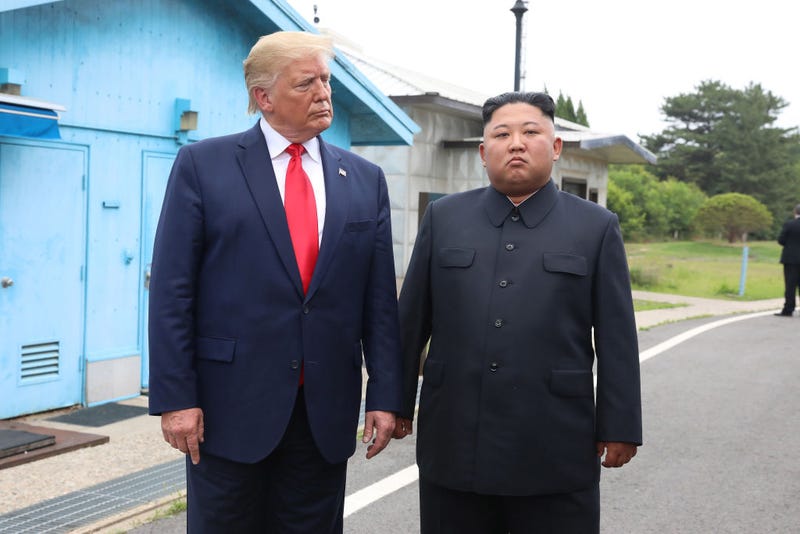
Former President Donald Trump claimed that he prevented a “nuclear holocaust” during his term in the Oval Office, according to a recently released deposition from this April.
“I considered this the most important job in the world, saving millions of lives. I think you would have nuclear holocaust, if I didn’t deal with North Korea,” he said. “And I think you might have a nuclear war now, if you want to know the truth.”
This quote came from a transcript of the April 13 deposition testimony Trump delivered in New York, N.Y., for Attorney General Letitia James’ business fraud lawsuit against Trump and his company. He said that, when he was in office and running for president, he did not have much to do with his namesake business.
According to The Hill, Trump’s lawyers released the 479-page transcript ahead of a Sept. 22 hearing. After that hearing, the lawsuit is expected to go to trial in October. James accused Trump of inflating his net worth by $2.2 billion in 2014 in a court document filed Wednesday.
Trump’s claim about preventing a nuclear holocaust was a reference to his talks with North Korean dictator Kim Jong Un. During Trump’s first year in office, Kim tested his first intercontinental ballistic missiles and demonstrated the potential to reach the U.S., per a Wilson Center analysis.
“While the execution may have been lacking, he did attempt a new approach, and that offers important lessons,” said the center of Trump’s response to the potential threat.
At first, Trump threatened Kim with “fire and fury like the world has never seen,” and tension increased so much that even China and Russia backed sanctions on Pyongyang. However, by 2018 Kim had changed course. That year, he met with Trump in Singapore, making Trump the first sitting U.S. President to meet with a North Korean leader.
“By meeting Kim, Trump was accused of legitimizing the young dictator and playing into his domestic propaganda – both of which were valid concerns – but that doesn’t mean direct engagement was necessarily wrong,” said the Wilson Center. “Refusing to talk to Kim hadn’t stopped him from developing nuclear weapons so far, and in North Korea’s top-down political system he was the only one capable of making real concessions. In short, it was worth a try.”
Still, Trump’s approach had snags, including comments that could undermine alliances with South Korea and the cancellation of military exercises. Kim had advanced North Korea’s military capabilities yet again before the end of Trump’s term, the Wilson Center said.
According to the Federation of American Scientists, there were roughly 12,500 nuclear warheads located in nine countries as of 2023. Most are held by the U.S. (5,244) and Russia (5,889), while North Korea had an estimated 30.
“Under even the smallest nuclear scenario, a localized war between India and Pakistan, global average caloric production decreased 7% within five years of the conflict,” said a Rutgers University analysis from last August. Pakistan has an estimated 170 warheads and India has an estimated 164.
In April, the U.S. said it would send nuclear-armed submarines to South Korea “to help protect against rising threats from North Korea and Kim Jong Un,” and in June, President Joe Biden announced the continuation of a national emergency declaration regarding North Korea.
“The existence and risk of the proliferation of weapons-usable fissile material on the Korean Peninsula and the actions and policies of the Government of North Korea continue to pose an unusual and extraordinary threat to the national security, foreign policy, and economy of the United States,” said a notice from the White House.
Just this month, North Korea executed a failed launch of a reconnaissance satellite “that used ballistic missile technology in clear violation of UN Security Council resolutions,” according to the U.S. State Department. Sanctions against two individuals and one entity engaged in revenue generation activities that support North Korea’s weapons of mass destruction and ballistic missile programs were announced Thursday.
This week, the White House also shared that it “had received intelligence showing North Korean leader Kim Jong Un and Russian President Vladimir Putin had exchanged letters with one another,” as Russia continues an invasion of Ukraine.
“I was interested in solving the problem with North Korea, which was ready to blow up, and solving the problems we had with China, who was just ripping us off left and right, and making sure that Russia never went into Ukraine, which they didn’t, under auspices and, you know, a lot of other things,” Trump said in his deposition. “There were a lot of things that were happening in the world, as you probably know.”
